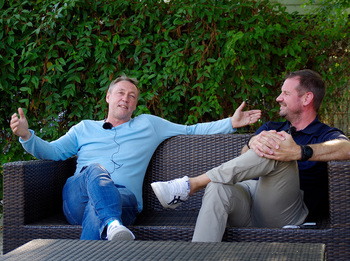
SAVE THE
DATE
Harley Davidson Days Hamburg // 26.6..-1.7.24
10 years Cybergroup BeachCup // 29.6.24
Harley Davidson Days Swiss // 3. - 8.7.24
Mustang Meeting Swiss // 2. - 4.8.24
Talking to Crimex
 Known across the sector for being rather provocative, promotional materials supplier Crimex also has a reputation going back many years for outlandish and unusual ideas. Time to have a chat with the competition in our podcast!
Known across the sector for being rather provocative, promotional materials supplier Crimex also has a reputation going back many years for outlandish and unusual ideas. Time to have a chat with the competition in our podcast!In our fourth podcast, Steven Baumgärtner meets up with Claus Roeting, CEO of Crimex, an expert in his field, who has spent more than 20 years coming up with unusual and unorthodox ideas for promotional materials. Failing to stay true to the theme of our podcast "On the move", this time we will be completely immobile and chilled in a garden in Hamburg. Yet in terms of mental activity, we'll be even more active than usual - as we have grown accustomed to and expect with these two individuals. What, you mean he's talking to the competition? No, to a colleague, and it's better to talk to them than to talk about one another!
We don't want to call him a cheeky rascal from the north of Germany, but he is very well known in the promotional materials sector as being at least rather provocative. Whether he's thinking up names like "Shake yourself one" for an app, stomping through the PSI trade fair dressed as a toilet technician in blue overalls, giving out QR codes for job ads, or almost getting thrown out of the trade fair because the music he plays is too loud. Claus Roeting and Crimex have a reputation for always being a bit different. We hear the story of how the two CEOs first met in Italy – one strongly focused on an online approach, the other more oriented towards full service; they are in fact hardly competitors. Still today, they get on well and treat one another like colleagues.
With the introduction of Fullmex, however, Crimex are expanding their area of business to include their own full service option, one which certainly earns respect in terms of its complexity, as Roeting admits. For this reason, he doesn't operate worldwide, but prefers to stay within Europe. The agency has, however, established that more and more customers from industry prefer to cut down on staff and to outsource warehousing, shop solutions, logistics, etc. Crimex has invested an amount that now runs into six figures and has employed two programmers who have been working for two years now to develop a tool that doesn't have to draw on the heterogenous data of suppliers but can instead extract the right article data itself using matching technology in order to produce consistently perfect results for the customer. In the future, young customers will perhaps be able to configure their products themselves, although the really big orders and special production runs will continue to come in verbally or via the telephone.
At some point, the conversation of course turns to the mountain of a million pennies that Claus Roeting is hoarding in his cellar. There are plans for them to be transformed into euros one day; the entrepreneur has for some time now been looking for a taker who would like to turn his treasure trove into a small fortune by using it for an unusual advertising idea. Not completely crazy, but certainly pretty wacky, as might be expected of him. Roeting doesn't have any issues with sharing the idea; after all who else has a mountain of coins like that in their cellar to copy him?
Alongside supposedly crazy ideas, however, Crimex remains flexible and at least keep their finger on the pulse, in fact they often tend to be ahead of the game. Although the trend in the sector is moving towards full service, internationalisation and consolidation, the company is concentrating on the best possible search engine optimisation and bold investments so they can continue to stay ahead of the competition.
Roeting is also proud of the fact that, in these difficult times of the Covid-19 pandemic, he still employs 75 people and has managed to keep his company in the black. This was made possible by various measures, including the closure of all their offices, with all employees being provided with the facilities to work from home at very short notice. Despite their provocative image, which is apparently intentional, the company is on a firm footing; the founder's own son is ready in the starting blocks to take over as his successor. In future, Claus Roeting plans to focus on his hobbyhorses IT and Marketing, and the Sales Division has a new head of department as of this year in the shape of Stephan Voepel.
In general, the entrepreneur is in favour of working from home. Even though he admits that not all his employees are able to work effectively from home, he nevertheless sees major advantages in the concept, for example the savings in terms of travelling time. In particular young people, who have a completely different approach to the online world, will apparently need much less personal contact in the office in the future, he has established, not completely without concern.
An issue that he gets extremely worked up about is the slow rate of progress of digitalisation in Germany. Having grown up in South America, he gets quite irritated by the often staid and arrogant manner of the Germans. Roeting fears that if you rest on your laurels, you run into danger of missing new developments and of being overtaken by neighbours who, in his opinion, are often underestimated. When he is in other countries, Roeting is regularly asked what German politicians are actually doing when it comes to digitalisation, with a network that fails to stand up to comparison with any of its European neighbours. And he refuses to even touch on the subject of organic labels in the conversation.
Very exciting, listening to these two very different characters, who are however both very successful with their concept and their approach and who both pursue a clear vision. Why should we be seen as taking something away from one another? There's enough cake to go round after all... isn't there? Have a listen!
https://bit.ly/Podcast_mit_Crimex




